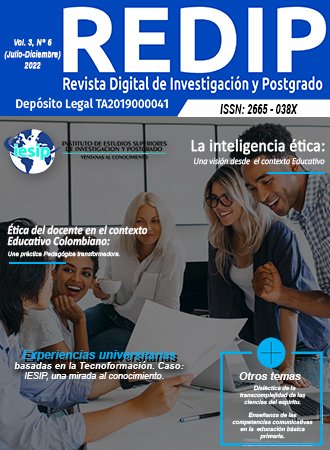Entrepreneurship
Theories and entrepreneurialeducation at the university level
DOI:
https://doi.org/10.59654/amhzce29Keywords:
Entrepreneurship, theories, entrepreneurial education.Abstract
The purpose of this article is to describe entrepreneurship from the theories that explain it and entrepreneurship education at university. The subject is a matter of great scientific production worldwide. The business idea, business creation, motivation for entrepreneurship are part of what today
is considered vital in universities because in a global economy economic growth goes hand in hand with the alliances between university-business, university-public institutions, the idea of entrepreneurial university and university that forms entrepreneurs is the new model of university. Likewise, entrepreneurship is explained from the theory of human behaviour theories, of expectation, social learning, planned behaviour and McClellan's theory of needs. The latter is the theory that dominates the studies that explain how entrepreneurship originates. Nevertheless, the theoretical references and studies have served to ensure that entrepreneurial education is in full development in universities; a very positive aspect that has led to innovation, curricular revision of the curricula and competitiveness
among universities.
Downloads
References
Ajzen, I. (1991). The Theory of Planned Behavior. Organizational Behavior & Human Decision Processes, 50, 179-211. doi:10.1016/0749-5978(91)90020-T
Alshrari, A. D., Aljaaidi, K. S. & Hassan, O. W. K. (2021). Saudi Arabian 2030 vision and entrepreneurial intention among university students. AD-minister, (38), 43-62. https://doi.org/10.17230/ad-minister.38.2
Bandura, A. (1977). Self-efficacy: Toward a Unifying Theory of Behavioral Change. Psychological Review, 84(2), 191-215. https://www.google.com/url?sa=t&rct=j&q=&esrc=s&source=web&cd=&cad=rja&uact=8&ved=2ahUKEwi5-e3AlaCBAxUZmWoFHZO2CzwQFnoECA0QAQ&url=https%3A%2F%2Fpsycnet.apa.org%2Frecord%2F1977-25733-001&usg=AOvVaw09ekqzQXpC9Y2G2ZNHx2n-&opi=89978449
Bandura, A. (1982). Self-efficacy mechanism in human agency. American psychologist, 37(2), 122-147. https://www.google.com/url?sa=t&rct=j&q=&esrc=s&source=web&cd=&cad=rja&uact=8&ved=2ahUKEwjpoMqFlaCBAxXQmGoFHXUADQAQFnoECA0QAQ&url=https%3A%2F%2Fpsycnet.apa.org%2Frecord%2F1982-25814-001&usg=AOvVaw1S8ZNX2_vOE8zp46lKLIyr&opi=89978449
Caicedo, G. (didiembre de 2013). El rol de la universidad en ecosistemas de innovación. ASPAE, 3(30). https://www.google.com/url?sa=t&rct=j&q=&esrc=s&source=web&cd=&cad=rja&uact=8&ved=2ahUKEwjIlr_TlaCBAxUBlWoFHUVKAN4QFnoECA0QAw&url=https%3A%2F%2Feventos.espol.edu.ec%2Fagenda%2Fshow_event%2F81503%2Fel-rol-de-las-universidades-en-los-ecosistemas-de-innovacion.html%23%3A~%3Atext%3DLas%2520universidades%2520contribuyen%2520directa%2520e%2Ccon%2520los%2520ecosistemas%2520de%2520emprendimiento.&usg=AOvVaw3Z_0u1ZXPVOeFhRXZXNDjY&opi=89978449
Calzado-Barbero, M., Fernández-Portillo, A. y Almodovar-González, M. (2019). Educación emprendedora en la universidad. Journal of Management and Business Education, 2(2), 127-159. https://dialnet.unirioja.es/servlet/articulo?codigo=7291790
Carland, J. W., Hoy, F. & Carland, J. A. (1988). Who is an enterpreneur? Is a question whorthasking. American Journal of small business, 13, 33-39.
Erez, A. & Isen, A. M. (2002). The Influence of Positive Affect on the Components of Expectancy Motivation. Journal of Applied Psychology, 87(6), 1055-1067. https://www.google.com/url?sa=t&rct=j&q=&esrc=s&source=web&cd=&cad=rja&uact=8&ved=2ahUKEwj13-KJk6CBAxXQmGoFHQ05DywQFnoECA0QAQ&url=https%3A%2F%2Fpubmed.ncbi.nlm.nih.gov%2F12558213%2F&usg=AOvVaw1KqwgnQGm5CEdV_-RImlxV&opi=89978449
García-Peñalvo, F. J. (2016). La tercera misión. Education in the Knowledge Society (EKS), 17(1), 7-18 (2016). https://revistas.usal.es/index.php/eks/article/view/eks2016171718/14803
Gatewood, E; Shaver, K; Powers, J & Gartner, W. (2002). Entrepreneurial expectancy, task effort, and performance. Entrepreneurship Theory and Practice, 27(2), 187-206. doi:10.1111/1540-8520.00011
Guerrero, M. y Urbano, D. (2012). Transferencia de conocimiento y tecnología. Mejores prácticas en las universidades emprendedoras españolas. Gestión y política pública. XXI(1), 107-139. http://www.scielo.org.mx/pdf/gpp/v21n1/v21n1a4.pdf
Kantis, H., y Angelelli, P. (2020). Emprendimientos de base científico-tecnológica en América Latina: Importancia, desafíos y recomendaciones para el futuro. Banco Interamericano de Desarrollo. Doi: 10.18235/0002156
Krueger, N. F. & Carsrud, A. (1993). Entrepreneurial intentions: Applying the theory of Planned behaviour. Entrepreneurship and Regional Development, An International Journal 5(4), 315-330. https://www.tandfonline.com/doi/abs/10.1080/08985629300000020
Krueger, N. F. & Brazeal, D. V. (1994). Entrepreneurial Potential and Potential Entrepreneurs. Entrepreneurial Theory and Practice, 91-104. https://cemi.com.au/sites/all/publications/Krueger%20and%20Brazeal%201994.pdf
Marulanda, V. A., Montoya, R. I. A., Vélez, R. J. M. (2014). Teorías motivacionales en el estudio del emprendimiento. Pensamiento y gestión( 36), 206-238. https://www.google.com/url?sa=t&rct=j&q=&esrc=s&source=web&cd=&cad=rja&uact=8&ved=2ahUKEwiR8Zb2k6CBAxUkkmoFHRBRBvIQFnoECB0QAQ&url=http%3A%2F%2Fwww.scielo.org.co%2Fscielo.php%3Fscript%3Dsci_arttext%26pid%3DS1657-62762014000100008&usg=AOvVaw3JomRpv8b2d63PplFrI6mG&opi=89978449
Ocampo-López, C., Ramírez-Carmona, M., Rendón-Castrillón, L., & Vélez-Salazar, Y. (2019). Applied research in biotechnology as a source of opportunities for green chemistry start-ups. Sustainable Chemistry and Pharmacy, 11, 41-45. Doi: 10.10 16/j.scp.2018.12.005
Pacheco-Ruiz, C., Rojas-Martínez, C., Niebles-Nuñez, W. y Hernández-Palma, H. G. (2022). Caracterización del emprendimiento desde un enfoque universitario. Formación universitaria, 15(1), 135-144. https://dx.doi.org/10.4067/S0718-50062022000100135
Papadaki, Š., Novák, P. y Dvorský, J. (2017). Attitude of university students to entrepreneurship. Economic Annals-XXI, 166(7-8), 100-104. http://ea21journal.world/index.php/ea-v166-20/
Renko, M., Kroeck, K., & Bullough, A. (2012). Expectancy Theory and Nascent Entrepreneurship. Small Business Economics, 39, 667-684. https://doi.org/10.1007/s11187-011-9354-3
Rodríguez, C. y Jiménez, M. (2005). Emprenderismo, acción gubernamental y academia. Revisión de la literatura, 15(26), 73-89. https://revistas.unal.edu.co/index.php/innovar/article/view/40/73
Rojas, G. Y., Pertuz, V., Navarro, A. y Quintero, L. T. (2019). Instrumento para Identificar Características Personales y Didáctica Utilizadas por los Docentes en la Formación de Emprendedores. Formación Universitaria, 12(2), 29-40. https://www.google.com/url?sa=t&rct=j&q=&esrc=s&source=web&cd=&cad=rja&uact=8&ved=2ahUKEwjL9Pzpl6CBAxXVlWoFHTTUCbEQFnoECBcQAQ&url=http%3A%2F%2Fwww.scielo.cl%2Fscielo.php%3Fscript%3Dsci_arttext%26pid%3DS0718-50062019000200029&usg=AOvVaw0ZwCM5Y7VQWWrMs-5W1IN_&opi=89978449
Shaver, K. G. (2004). Overview: The cognite characteristics of the enterpreneur. Handbook of Entrepreneurial Dynamics: The Process of Business Creation, 131-137.
Valenzuela-Keller, A. A., Gálvez-Gamboa, F. A. y Moreno-Villagra, M. (2021). Actitudes emprendedoras de estudiantes universitarios de primer año en Chile. Formación universitaria, 14(4), 103-112. https://www.scielo.cl/scielo.php?script=sci_arttext&pid=S0718-50062021000400103&lang=es
Van Eerde, W. & Thierry, H. (1996). Vroom’s Expectancy Models and WorkRelated Criteria: A Meta-Analysis. Journal of Applied Psychology, 81(5), 575-586. https://psycnet.apa.org/record/1997-41278-010
Downloads
Published
Issue
Section
License
Copyright (c) 2022 Revista Digital de Investigación y Postgrado

This work is licensed under a Creative Commons Attribution-NonCommercial-ShareAlike 4.0 International License.
Esta licencia permite a los reutilizadores distribuir, remezclar, adaptar y desarrollar el material en cualquier medio o formato únicamente con fines no comerciales, y solo siempre que se atribuya al creador. Si remezclas, adaptas o construyes sobre el material, debes licenciar el material modificado bajo términos idénticos. CC BY-NC-SA incluye los siguientes elementos:
![]() POR: se debe dar crédito al creador.
POR: se debe dar crédito al creador.![]() NC: Sólo se permiten usos no comerciales de la obra.
NC: Sólo se permiten usos no comerciales de la obra.![]() SA: Las adaptaciones deben compartirse en los mismos términos.
SA: Las adaptaciones deben compartirse en los mismos términos.











